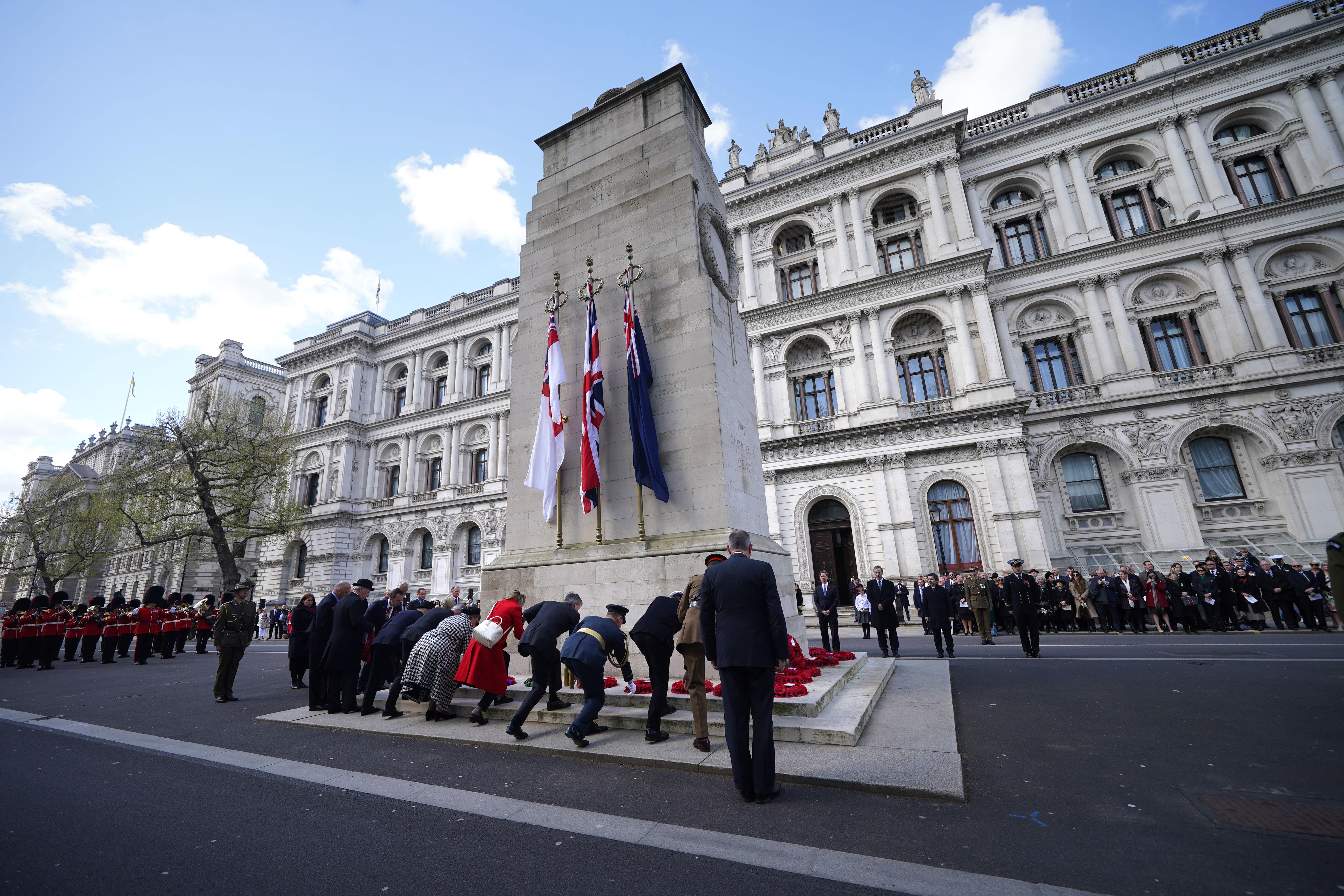Armistice Day is no time for a war of civilisations
Editorial: Despite unhelpful interventions from ministers, next weekend’s Remembrance Day service will be observed in the usual dignified silence – London’s pro-Palestinian protesters are not hell-bent on destruction

For more than a century, the Cenotaph in London has been the focus of a national, indeed international, solemn act of commemoration for British and Commonwealth service personnel who made the ultimate sacrifice during two world wars and many other conflicts.
The imposing monument, designed by Edwin Lutyens more than a century ago, has a sombre feel to it, stands notably austere, and is free of any obvious religious symbolism – not least because the sacrifice of men and women of many faiths and none are here honoured.
Sadly, the monument has been attacked a few times by misguided protesters of various kinds in recent years, suffering minor damage. But that is all the more reason to protect it and the values it represents.
So the pleas made by the security minister, Tom Tugendhat, to ask that the pro-Palestinian protesters steer away from the area around the Cenotaph are understandable. Many, including those with the greatest sympathy for the plight of the innocent in Gaza, would be distressed at such an intrusion, even on Saturday, Armistice Day, when the obsequies are lightly observed.
Obviously, there can be no question of any dilution or disturbance of the main Remembrance Day service, attended by the King, representatives of the Commonwealth, and political and faith leaders. It must be observed in dignified silence.
Fortunately, it seems that the Palestinian Solidarity Campaign and other groups were never intending to be near the Cenotaph over the Remembrance weekend. The mayor of London, one of those to whom Mr Tugendhat addressed his letter, has actually endorsed his view. He has spoken sincerely about how important such national moments are and respectfully points out to the protest organisers that they risk losing the support they have from many quarters by not being respectful to others. As they express their feelings of shared grief with the victims of the conflict in Gaza, they need not interrupt the grief of those remembering a son, a sister or a dad lost in previous wars. The homeless and bereaved people of Gaza have no quarrel with the British people.
Of course, there remains the possibility of some stray protesters causing trouble to attract the wrong kind of attention. The Metropolitan Police should be able to deal with them in the usual way, with proportionate force and common sense. Those who call for all such demonstrations to be banned seem not to realise that, for all the noise and disruption, they are generally not breaking the laws on public order or terrorism as legislation currently stands. The home secretary, as ever, raises the tension levels by labelling these events “hate marches”; yet there is no law against that, as such. Besides, they will likely not be interrupting Remembrance Sunday.
Where the police are justified in taking action is in arresting on the spot, or in subsequent investigations, people identified as making vile antisemitic attacks, including hate speech, and advocating the barbarian methods and cause of Hamas. The slogan “Palestine free from the river to the sea”, and its variants, does feel disturbing, even intimidating, to Jews and others who believe in Israel’s right to exist, a core part of the accepted definition of antisemitism. Yet the law is no help to the police in determining in what circumstances uttering it is unlawful.
The anti-terror and anti-hate speech laws need a better definition: the Jewish people of Britain have the right to live and walk in peace in their own streets. If, as seems the case, the laws against race and religious hate are still too vague or weak, then the government can revise them in the next session of parliament.
Yet the commissioner of the Metropolitan Police, Mark Rowley, is profoundly correct when he says it is up to him, on the advice of the Crown Prosecution Service, to uphold the law as it stands, and not as politicians would like it to be. It is wrong for our ministers to interfere in operational policing matters, as they are prone to, though Mr Tugendhat’s letter is relatively mild. A world in which a British home secretary can order the arrest of some unpleasant, idiotic protester she has read about in the newspapers is not the one those remembered at the Cenotaph fought for.
A wide cordon around the Cenotaph, such that any protests in London cannot be heard during the morning of the 11th and the duration of Remembrance Sunday, would ensure the peace and dignity these commemorations demand. It would be enforceable by the police because the Palestinian march organisers, contrary to some reports, are not hell-bent on destruction – and we should not forget that the marchers in any case come from many backgrounds (including some Jewish groups). If Hamas, like Osama bin Laden before them, wants to start a war of civilisations, we shouldn’t oblige it.
At moments like these, when Islamophobia is on the rise, it’s important to remember that Muslim people in Britain want nothing more than to make peaceful lives for themselves and their families, the same as everyone else. Some Muslim people, too, fought for king or queen and country. The Muslim community is not out to destroy symbols of Britishness because they are not anti-British, as the hard right suggests. They simply wish to voice their anger at events in Palestine. That is their right. Those fascistic extremists who wish to ban their marches and provoke more violence have their own anti-British agenda, as it happens.
Next weekend, then, in quietude, poppies can be worn, prayers can be offered, memories cherished without interruption, and the many wreaths left undisturbed on the Cenotaph. We shall remember them.






Join our commenting forum
Join thought-provoking conversations, follow other Independent readers and see their replies
32Comments